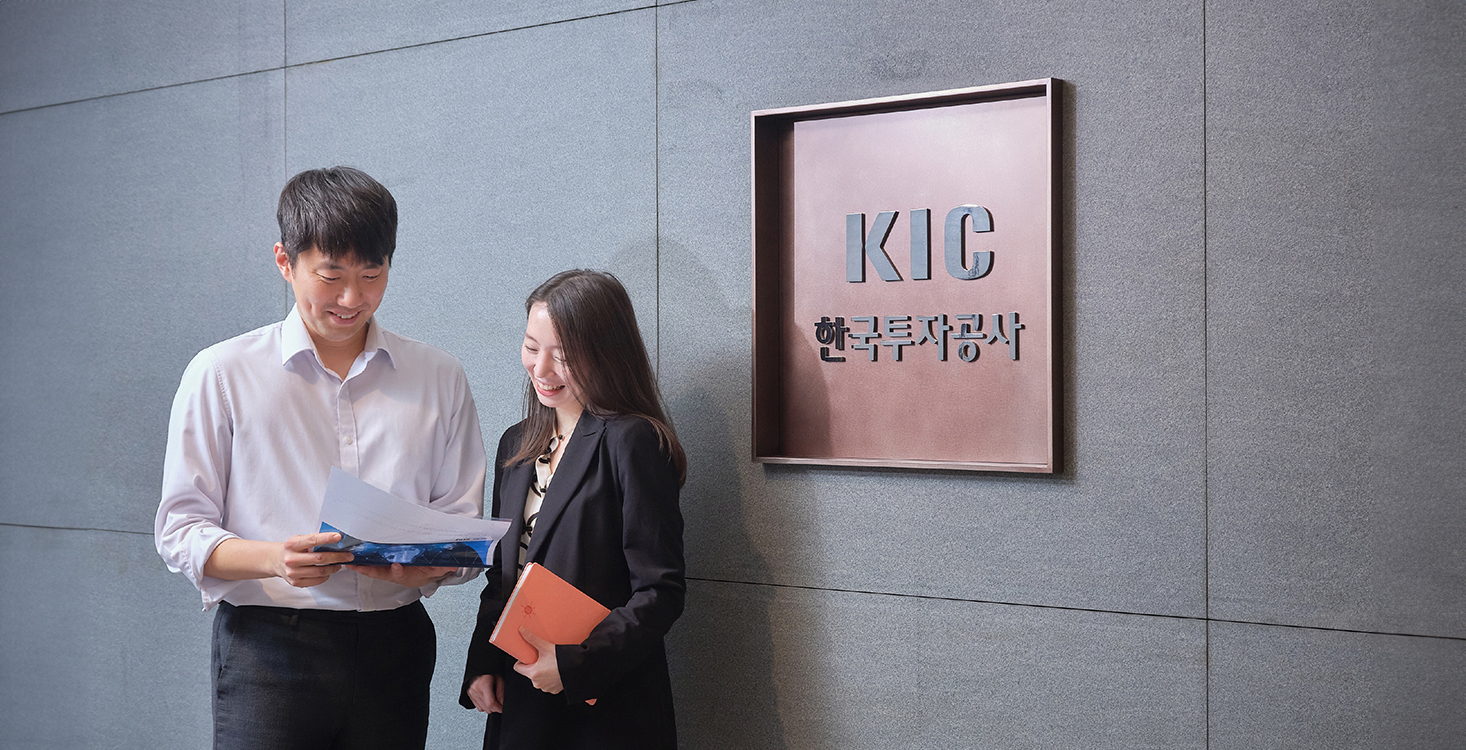Investment Highlights
Investments
Governance & Organization
INVESTMENTS
Traditional Assets
Traditional assets make up the core of KIC’s investment portfolio and consist of equities, fixed income, and asset allocation. They play a pivotal role in achieving KIC’s investment objectives.

KIC began investing in fixed income in 2006 and has since expanded its asset classes to include equities and inflation-linked bonds, as well as increased the size of its investments. Traditional investments account for 78% of KIC’s total portfolio and have performed steadily, with an annualized return since the initial investment of 4.63% as of 2023. As the scope and scale of our investments grew, so did the need to adjust our asset class weights and to pursue companywide risk management. Since 2019, we have been holding a quarterly asset allocation forum, whereby investment and risk managers engage in in-depth discussions and the results of which are actively reflected in our investment decision-making. Based on financial market outlooks and asset class analyses, KIC derives expected returns for each asset class and conducts optimal asset allocation that takes into account enterprise risk management levels. Our aim is for all assets to earn their target returns. We strive to outperform the benchmark by developing various relative strategies within asset classes and adjusting asset class weightings in response to changes in economic conditions and financial market fluctuations. We also strive to enhance returns through asset class rebalancing, managing an appropriate ratio between direct and indirect investments, diversifying strategies within asset classes, and diversifying among various investment managers.
Macroeconomic Analysis
KIC analyzes global macroeconomic research from various perspectives to ensure effective asset allocation. Through considering the economic structures and political and social issues of major countries, we lay the groundwork to actively respond to changes in the investment landscape. We use the analysis for short-term market responses and to build our portfolio in the mid- and long-term.
Our regional managers also actively communicate and consult with one another, which allows for the mutual verification of investment ideas. We build a strategic portfolio based on the global economic and market outlook derived through this process, contributing to long-term returns.
Equities
KIC uses fundamental analysis and quantitative models to identify equities around the world that are undervalued relative to their intrinsic value with a long-term investment perspective. While focusing on generating excess returns in accordance with investment guidelines, we manage our portfolios in consideration of various risk factors, such as changes in the macroeconomic environment.
We pursue stable and sustainable returns through building a balanced portfolio of fundamental and quantitative strategies and of direct and external investments.
Direct Investments
The fundamental strategies for the direct equity management of KIC’s Equity Investment & Strategy Group and the Global Equity Investment Group aim to achieve excess returns through analyses of the intrinsic value of individual companies.
Formed in 2022, the Global Equity Investment Group has strengthened KIC’s sector-investing system with the global strategies already in place to help drive stable long-term performance.
Our New York and London offices run region-specific portfolios for the locally focused global investment strategy while headquarters manages the portfolio from a global perspective, taking into account the relative advantages of companies around the world.
External Equity Management
The external equity investments of the Equity Investment & Strategy Group seek to generate excess returns through diversifying investments by outsourcing managers highly capable of outperforming in global equity markets. We balance various investment processes and philosophies, including quantitative and fundamental and value and growth, and strive to deliver superior performance over the long term.
Quant Equity Management
For quantitative investments, the Quant Equity Investment Group focuses on developing KIC’s direct investment capabilities. It has built a global portfolio management and trading system through benchmarking advanced systems overseas. After starting with a passive strategy in 2008, the group adopted a quantitative alpha (excess return) model through which investment decisions are made using algorithms based on mathematical and statistical models. It uses an enhanced strategy to improve cost efficiency and returns.
The group uses big data and machine-learning technologies to proactively respond to changes in the global investment environment, including advancements in data and artificial intelligence technologies. It is building a unique management platform based on strengthening ESG and theme-based strategies as well. The group also runs a quota program that entrusts domestic securities firms with overseas stock trading orders as part of a continued effort to support growth in Korea’s finance industry.


Fixed Income
KIC invests in sovereign bonds, government-related bonds, corporate bonds, and securitized bonds in various countries and currencies. The aim is balanced portfolio management that effectively uses market, credit, and liquidity risks by integrating bottom-up investments based on specialized investment capabilities by region and sector and top-down investments based on comprehensive judgments of the global market. We also seize diverse investment opportunities in the global fixed-income market based on collaborations between headquarters and overseas offices and the synergies generated from the integrated management of direct and indirect investments.
Direct Fixed-Income Investment
For the directly invested fixed-income portfolio, we focus on balancing top-down and bottom-up investments and actively managing risk to respond to financial market volatility and generate excess returns. Based on sector-specific management expertise and constant communication between headquarters and overseas offices, we take advantage of diverse investment opportunities in the global fixed-income market.
External Fixed-Income Management
For the externally invested fixed-income portfolio, KIC seeks to achieve stable mid- to long-term excess returns through selecting managers capable of generating strong excess returns in the global fixed-income market, constructing a balanced portfolio, and rebalancing according to global economic and market conditions.
Tactical Asset Allocation
KIC has a process to establish and implement tactical asset allocation strategies for the entire traditional asset portfolio. Tactical asset allocation aims to adjust asset class weights through spot allocation, hedging strategies, and alpha strategies and to respond to short-term market volatility while managing total return volatility across traditional assets and improving returns.
KIC continues to develop quantitative analysis indicators based on economic and market data analysis as well as to make expected scenarios based on a variety of analyses for historical financial crises and geopolitical events, to respond to higher market volatility. Through these efforts, KIC works to enhance its systematic structure for managing investments and analyzing risk for the traditional asset portfolio.


